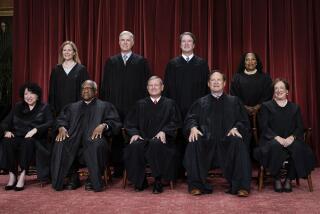Study of 462 Bork Votes Finds Pro-Business Bent
- Share via
WASHINGTON — In his 5 1/2 years as a federal appeals court judge, Supreme Court nominee Robert H. Bork consistently has voted for business and against individuals and public interest groups, according to a study released Thursday of all 462 published decisions in which Bork participated.
His performance on the bench “is not explained by the consistent application of judicial restraint or any other judicial philosophy,” said the liberal Public Citizen Litigation Group. “ . . . One can predict his vote with almost complete accuracy simply by identifying the parties in the case.”
The study, the most extensive yet published of Bork’s record as a judge on the Circuit Court of Appeals for the District of Columbia, found that Bork typically votes with the government when individuals or public interest groups challenge federal agencies. But when businesses bring the challenge, the study found, Bork usually votes in their favor.
Cases Involving Individuals
Bork also has voted consistently to restrict access to the courts for individuals who challenge government actions. In 14 such cases, which included complaints filed by Social Security recipients, handicapped persons, prison inmates and the U.S. Senate, Bork voted against hearing the complaint each time.
The report cited one case in which Bork sided with individuals who challenged a government regulation. The individuals were President Reagan and Sen. Edward M. Kennedy (D-Mass.), who won a ruling from Bork overturning a Federal Election Commission decision on their campaign expenses.
The report challenged Reagan’s contention that Bork is a “fair-minded” and “detached” jurist.
“The White House has been selling Judge Bork as a moderate, middle-of-the-road replacement for the swing vote on the court, Justice (Lewis F.) Powell,” said Alan Morrison, Public Citizen’s director. “If the White House wants to come out and say . . . Bork ‘is predetermined in all his views and that he’s going to vote for business and we’re entitled to have someone like that confirmed,’ that’s perfectly all right. We’ll debate them on that issue.”
“But if you’re looking for a moderate,” Morrison added, “you are not going to find one in Judge Robert H. Bork.”
‘Mainstream Jurist’
Earlier this week, the White House told members of the Senate that Bork is a “mainstream jurist” who “has repeatedly criticized political, ‘result-oriented’ jurisprudence of both conservative and liberal philosophies.”
Public Citizen, which was founded by consumer activist Ralph Nader, usually does not take a stand on court nominees, Morrison said, but the organization sent a letter to the Senate Thursday officially opposing Bork.
A source close to Bork challenged some of the report’s conclusions but conceded the accuracy of other findings, particularly Bork’s votes on access to the courts. Restricting who can bring cases to court is part of Bork’s strongly held philosophy that courts should have only a limited role in reviewing the decisions of elected officials, the source said.
The source denied, however, that the statistics in the new report prove that Bork is politically biased in the way he votes when federal agencies are sued. The appearance of bias is largely a coincidence caused by the fact that the agencies more often challenged by businesses are less competent than those challenged by liberal public interest groups, the source suggested.
Finds Votes Predictable
But, said the report’s chief author, William B. Schultz, “we think it is striking that Judge Bork’s votes are so predictable.” The precise explanation for Bork’s voting pattern “may not matter,” Schultz added. “It’s the result that matters.”
Although Schultz and the other lawyers who prepared the report read all 462 decisions in which Bork participated, they concentrated on the 56 in which the federal appeals panels were split. Concentrating on cases in which at least one judge dissented weeds out the frivolous and easy cases and focuses attention on “the close cases in which Judge Bork will make a difference,” Schultz said.
Among those 56 cases, Bork voted to deny access to the courts in 14. In one case, in which the Senate challenged the constitutionality of President Reagan’s “pocket veto” of an appropriations measure, Bork wrote that the courts should decline to referee such constitutional disputes and let Congress and the President resolve them on their own.
Utility Rate Cases
Another 28 cases involved challenges to the actions of federal regulatory agencies. In eight cases--mostly utility rate cases--in which regulations were challenged by businesses, Bork voted against the regulation each time.
In 20 cases brought by public interest groups, individuals or unions, Bork voted for the regulation 18 times. The exceptions were one labor case and the election commission regulation challenged by Reagan and Kennedy.
More to Read
Sign up for Essential California
The most important California stories and recommendations in your inbox every morning.
You may occasionally receive promotional content from the Los Angeles Times.














